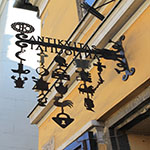Euroacademia Conferences
 Europe Inside-Out: Europe and Europeanness Exposed to Plural Observers (9th Edition) April 24 - 25, 2020
Europe Inside-Out: Europe and Europeanness Exposed to Plural Observers (9th Edition) April 24 - 25, 2020 Identities and Identifications: Politicized Uses of Collective Identities (9th Edition) June 12 - 13, 2020
Identities and Identifications: Politicized Uses of Collective Identities (9th Edition) June 12 - 13, 2020 8th Forum of Critical Studies: Asking Big Questions Again January 24 - 25, 2020
8th Forum of Critical Studies: Asking Big Questions Again January 24 - 25, 2020 Re-Inventing Eastern Europe (7th Edition) December 13 - 14, 2019
Re-Inventing Eastern Europe (7th Edition) December 13 - 14, 2019 The European Union and the Politicization of Europe (8th Edition) October 25 - 26, 2019
The European Union and the Politicization of Europe (8th Edition) October 25 - 26, 2019 Identities and Identifications: Politicized Uses of Collective Identities (8th Edition) June 28 - 29, 2019
Identities and Identifications: Politicized Uses of Collective Identities (8th Edition) June 28 - 29, 2019 The European Union and the Politicization of Europe (7th Edition) January 25 - 26, 2019
The European Union and the Politicization of Europe (7th Edition) January 25 - 26, 2019 7th Forum of Critical Studies: Asking Big Questions Again November 23 - 24, 2018
7th Forum of Critical Studies: Asking Big Questions Again November 23 - 24, 2018 Europe Inside-Out: Europe and Europeanness Exposed to Plural Observers (8th Edition) September 28 - 30, 2018
Europe Inside-Out: Europe and Europeanness Exposed to Plural Observers (8th Edition) September 28 - 30, 2018 Identities and Identifications: Politicized Uses of Collective Identities (7th Edition) June 14 - 15, 2018
Identities and Identifications: Politicized Uses of Collective Identities (7th Edition) June 14 - 15, 2018
The Politics of Kosovo Mythology in Serbian National Ideology
-
-

-
Presentation speakers
- Lara Jakica, Monash University, Australia
- Download presentation
Abstract:
This paper explores the appropriation of Kosovo mythology in Serbian popular culture; its use and misuse in political rhetoric and propaganda. Kosovo mythology, which is based on a medieval battle against the Ottomans has been revisited in Serbian cultural discourse on a number of occasions over the centuries, especially at the times of national crisis and a political struggle in the country when it seems to serve as a stronghold of reinventing and re-establishing national identity. This paper focuses on those motifs of medieval Kosovo, which portray the impact of mythology on Serbian national identity today. To illustrate the presence of Kosovo reference in contemporary Serbian cultural canon I focus on most popular texts, such as are feature films and nationalistic pop-folk songs. I also suggest that Kosovo as a cultural agent can be approached through the psychoanalytic theory of subjectivity of Jacques Lacan, which leads to a critique of the concept of ‘nationalism’ in modern day Serbia.
-
Related Presentations


















